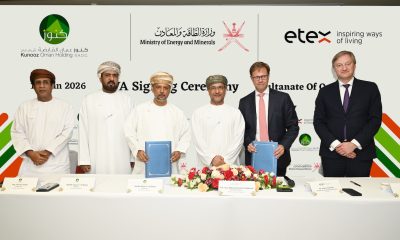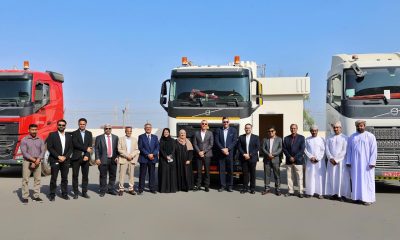News
SYNERGIES AT WORK
Greg Young, CEO, Ooredoo in Oman explains the rationale of having a single brand across countries and the expected benefits of the rebranding. An OER report.

Greg Young, CEO, Ooredoo in Oman explains the rationale of having a single brand across countries and the expected benefits of the rebranding. An OER report.
On February 25, 2013, the Ooredoo Group announced that it would be changing its brand to Ooredoo and that each of its operating companies in emerging markets across the Middle East, North Africa and South East Asia would adopt the new brand during the course of 2013 and 2014. In line with that decision, Nawras rebranded to Ooredoo on October 28, 2014.
Greg Young, CEO of Ooredoo in Oman explains the reasons for this shift: “As we look around, the world we see large and strong mono-brands with a global and multi-country dimension. The benefits of having a single regional or global brand is that you are investing in a single brand, which is spread across multiple entities, so the investment in developing the brand is done only once. Secondly, we increasingly exist in a global market and our customers travel overseas. They are online and have exposure to what is going on in other markets, so a global brand is more visible to our customers. Thirdly, we continue to invest in brand ambassadors, sponsorships and other advertising, which provide exposure into Oman from outside the country. For example, if you are watching satellite TV, a football match or some other sporting event, it is usually being watched by audiences across multiple locations.”
The Ooredoo group has Lionel Messi as its brand ambassador. As part of the company’s common branding, Ooredoo in Oman can use Messi for its branding through the global arrangement that Ooredoo has with him. Given the prohibitive costs, the legacy company, Nawras, would never be able to sign such an international footballer as a brand ambassador. “But with our group companies in Ooredoo we are able to justify investing in that kind of brand asset, which gives us the leverage and economies of scale that comes with being a part of a larger group,” says Young.
When TV commercials and advertising materials are being made, they are usually produced once at the group level and other group companies across different countries adapt them according to their needsand requirements. For example, the Ooredoo TV commercial with Messi, was shot only once in Europe, with multiple variations. To customise the commercial for the local market, Omani children were used during part of the shoot. The cost of customisation proved to be extremely small compared to the cost of making a complete TV commercial with Messi and local children from each market.
It works the other way too, with investments being made by individual Ooredoo members, benefitting others. For example, Ahmed al Harthy the racing car driver from Oman is a brand ambassador for Ooredoo in Oman, and he sports the company’s logo on his car and jersey. Al-Harthy races in a number of circuits outside Oman and while racing in other markets, the Ooredoo brand gets showcased there. Thus, an investment in an Omani brand ambassador, benefits the entire Ooredoo group of companies.
Greater leverage
“The other key thing is that increasingly our competitors or partners are companies out of Oman and they fall into a number of categories. First, we have international roaming arrangements with operators in other markets and we have to negotiate the rates that they will charge our customers when they visit their countries, and vice versa. When I negotiate with them as Ooredoo, I go to them with close to 100 million customers, but when trying to negotiate with them as Nawras, I had a brand which represented only two and a half million customers, so the level of leverage and negotiating power that we get under a common brand is much larger than under a single entity,” says Young. It is no surprise, then, that 20 out of the top 25 global telecom operators are single brand multiple country companies like Telefonica, Airtel, Vodafone, Telenor etc.
The change from Nawras to Ooredoo in Oman was not necessitated by a change in ownership. Qatar Telecom (Qtel) was a strong brand in Qatar, but it was not a brand that was replicable in the Oman. The Sultanate was the first country where Qtel started operations outside Qatar and since then the group has expanded its operations to several markets. Young comments that “having seen the disadvantages and costs of having multiple brands across different markets, the Ooredoo Group recognised that there were benefits in having a single common brand. The group commenced the rebranding with what was Qtel in Qatar and we are the eighth out of the various countries that have been rebranded. There are still more to rebrand across the Ooredoo footprint.”
The planning for rebranding from Nawras to Ooredoo started in the beginning of 2014. This process included zeroing on the right time to launch the brand, the advertising and marketing, products etc. Ooredoo in Arabic means ‘I want’ and the logo is a representation of the word Ooredoo. Says Young, “Most importantly, it is about what our brand stands for and our brand essence. We are a brand that is focused on local communities and human growth. So across all of the Ooredoo operating companies, human growth is at the heart of actually what we do, and it can mean helping the businesses of our customers to grow with improved telecommunications, helping their social life through telecommunications, helping the community through CSR, and of course the human growth of our own staff. Human growth is at the centre of Ooredoo’s brand principle and promise.
The company’s three key values are – Connecting, Caring and Challenging. “Connecting is about the way we aim to engage, collaborate and be involved in the communities in which we operate; Caring – where we always look to be supportive, trusted, responsible and respectful; and Challenging – our progressive approach, which seeks to improve and make a difference. That could be about innovation, doing things differently, the introduction of new types of services, constant improvement etc. You have to build those brand values and ensure that these are reflected in every interaction with the customer whether it is in a shop, telephone or on a billboard,” adds Young.
Economic concerns
The fall in international oil prices has led to speculation about royalty rates on telecom companies going up in Oman. Young clears the air on the issue, “Obviously we were a little surprised by speculative press reports about an imminent increase in the royalty rates on telecom companies. It was reported that there is some consideration by the appropriate authorities to increase our royalty rates from seven to 12 per cent. Obviously this would have a negative impact on the financial performance of our company and the sector. This was recognised by the stock market and as a result our stock prices dropped by 10-15 per cent within a matter of days. This is something that we need to work through with the appropriate authorities.”
The GDP growth and health of the country is important to all businesses including Ooredoo. The telecoms sector is an important part of the country’s economy, providing a service that facilitates growth. Young says, “As a publicly listed company, economic stability, a balanced budget and ongoing financial growth is clearly important to us. Given Oman’s dependence on petrochemicals, the country needs to plan for different eventualities. A consistent fall in the price of oil, would have a negative impact on the country’s finances and that’s something that economists and the government will have to plan for appropriately. As in any country, it is important to keep the budget in balance, manage inflation, GDP and economic growth.” One just can’t go wrong with such advice.
-

 News2 months ago
News2 months agoAI Security Conference 2025 Hosted by Securado Highlights the Changing Cybersecurity Landscape
-

 Insurance2 months ago
Insurance2 months agoSupporting Community Wellness: Liva Insurance Sponsors Muscat Marathon 2026 with Free Health Checkups
-

 Interviews1 month ago
Interviews1 month agoEXCLUSIVE INTERVIEW: TLS Rebranding Marks Strategic Leap Toward Innovation, Sustainability & Growth
-

 Insurance1 month ago
Insurance1 month agoLiva Insurance Supports Community Wellness Through “Experience Oman – Muscat Marathon 2026”
-

 Investment3 weeks ago
Investment3 weeks agoLalan Inaugurates Its First Overseas Manufacturing Facility, Marking Sri Lanka’s First Investment in SOHAR Freezone
-

 Banking & Finance1 month ago
Banking & Finance1 month agoA New Platform for SME Growth: Oman Arab Bank Unveils Tumouhi
-

 News3 weeks ago
News3 weeks agoKunooz Oman Holding Partners with Belgian company Etex for Local Gypsum-Based Business Development
-

 Construction4 weeks ago
Construction4 weeks agoInternational Heavy Equipment hosts Open Day at its Refurbished Facility in Sohar Industrial Area






























You must be logged in to post a comment Login